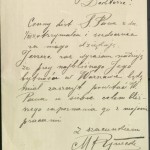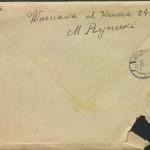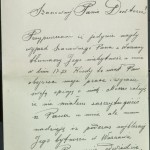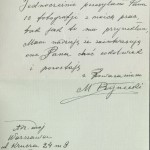In the Otto Schneid papers at the University of Toronto’s Thomas Fisher Rare Book Library, there are two handwritten Moshe Rynecki letters. The reason Schneid had these letters isn’t so terribly complicated. The story is that Schneid, himself an artist and historian, was writing a book in the 1930s on Jewish artists. In the course of his research he contacted various artists, including my great-grandfather, and requested an autobiography and photos of artwork for potential inclusion in his book. Although Schneid’s book was never published (the Nazis halted the printing of it) and a later version written in Hebrew while he was living in Israel was never published either, Schneid apparently held onto the letters my great-grandfather wrote him anyway. Schneid died in 1974. In 2002 his widow, Miriam, donated the unpublished manuscripts and background materials to the Fisher Library.
Before my visit to the Fisher Library I had never before seen my great-grandfather’s handwriting. Discovering the existence of the letters is really very important. Not only was Schneid interested enough in Moshe’s work to solicit photographs and an autobiography from him, but despite all the turmoil in his own life, he held onto them for 40-plus years and then his wife held onto them for another 28 years before donating them to the Fisher Library. I am only just beginning to study these letters and understand how this new information impacts the larger picture of my great-grandfather’s life of art.
The letters, written in a beautiful cursive, are visually stunning. They are in Polish and so before I actually knew what they said I stared at the cursive loops, the dramatic flair of the letters, and marveled at the splendid penmanship. The letters are so artistic – so expressive in and of themselves. But of course knowing what my great-grandfather actually wrote is important to further understanding his exchange with Schneid, and so I was thrilled when my father’s cousin sent me a translation. The first letter was pretty straightforward:
Dear Honorable Doctor,
I have received a very important letter from you, dated 1.XII.31 and I thank you very much for it. Again I express my hope that at your next visit to Warszawa I will have the honor to welcome you to my home, with the aim of more closely acquainting you with my work.
With kind regards,
M. Rynecki Warszawa 9.XII.31
The second letter sent me reeling and I had to read it twice. It said:
Dear Honorable Doctor,
I suppose that only a sudden necessity to leave Warszawa explains your absence from my home on the 17th, when you promised to view my works and give me your opinion of them. I am extremely sorry that I did not have the honor to offer you hospitality at my place, but I hope that during your next visit to Warszawa you will be kind enough to visit me. At the same time I am sending 12 photographs of my works, as I promised. I hope that my work will interest you, at least a little.
With kind regards,
M. Rynecki
It appeared, at first reading, that Otto Schneid had stood up my great-grandfather. I wasn’t mad, but I did feel so crushed for him. Of course I’ll never really know what happened. Perhaps Schneid had a personal family matter that needed urgent attention and he had to leave Warsaw on short notice and was unable to inform Moshe of his early departure. It hardly matters because what so very much intrigues me is the fact that Schenid kept the letters, photographs, and envelopes all those years. It makes me wonder, where else might I find links to my great-grandfather’s life and how does one research that? I’m not entirely certain, but I do know that the more I write about it, the more I talk about it, and the more people that know I’m searching for connections to my great-grandfather, the more I will learn.
Photos below Courtesy of the Thomas Fisher Rare Book Library, University of Toronto.
- Page 1of2. Letter from Rynecki to Schneid



